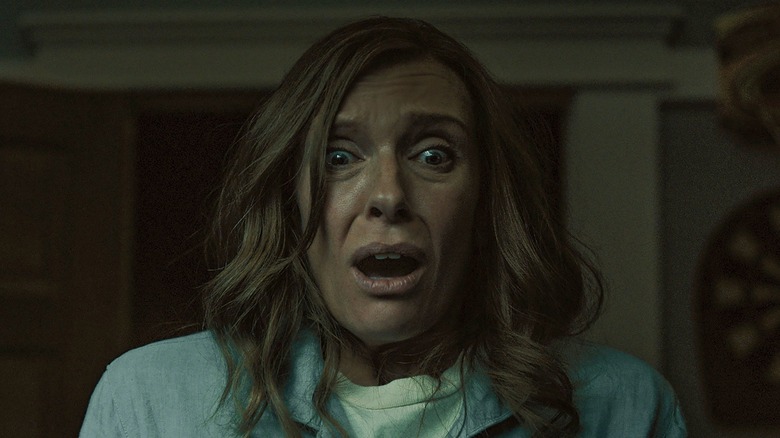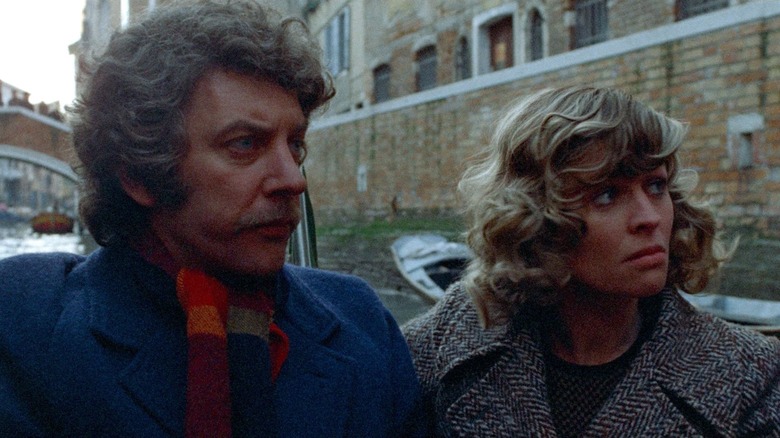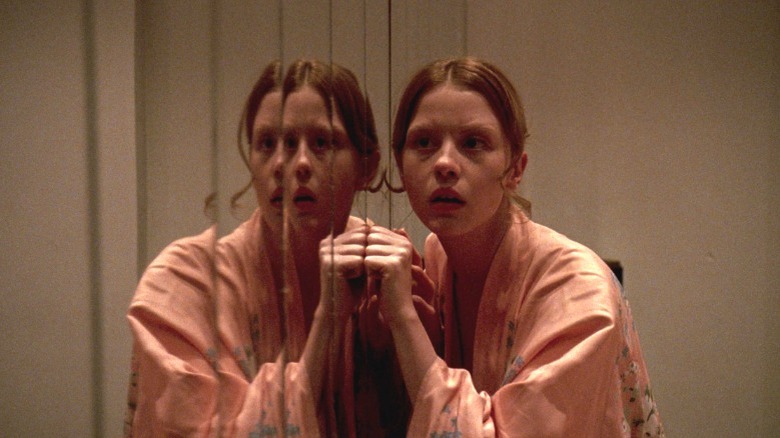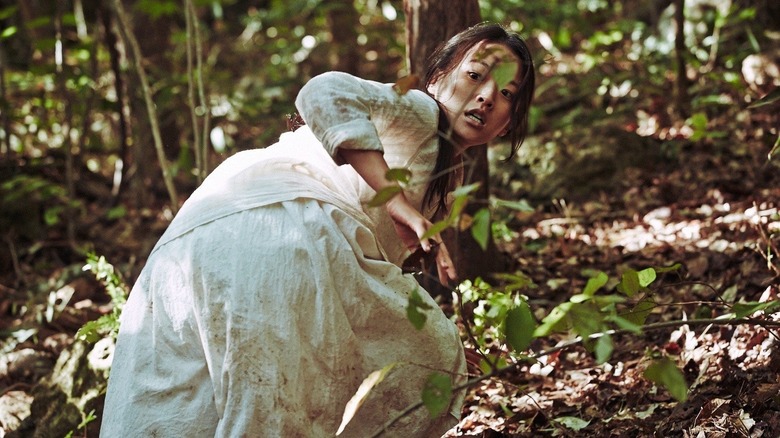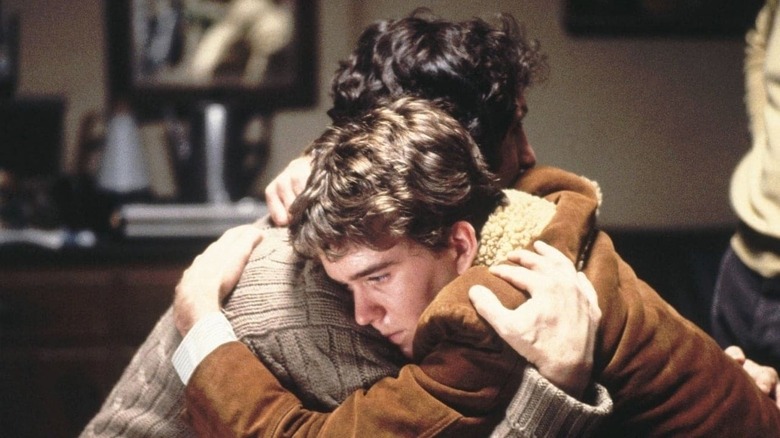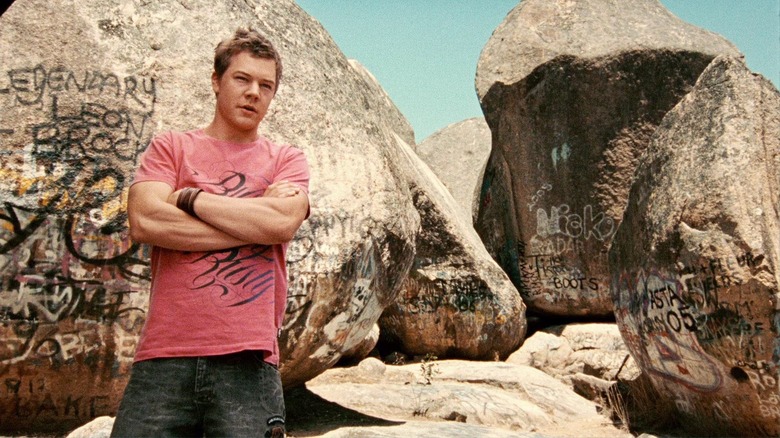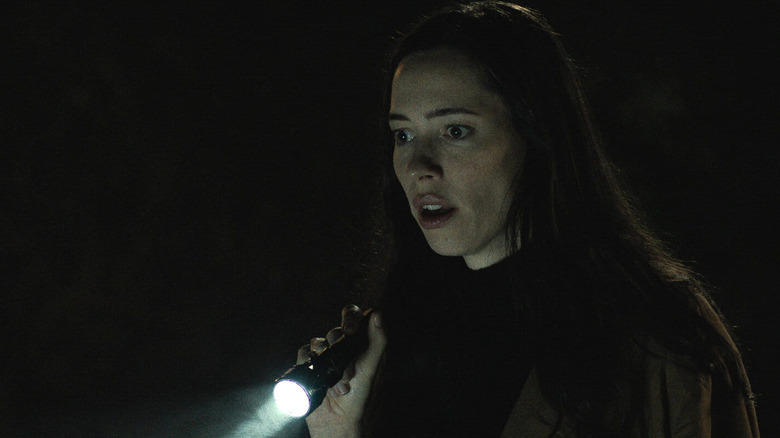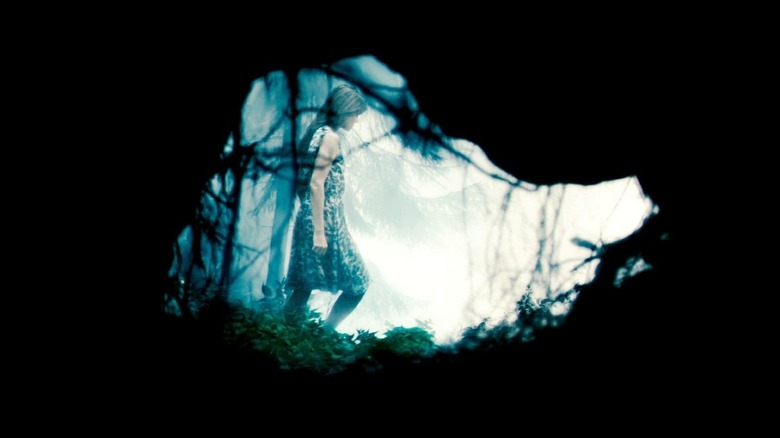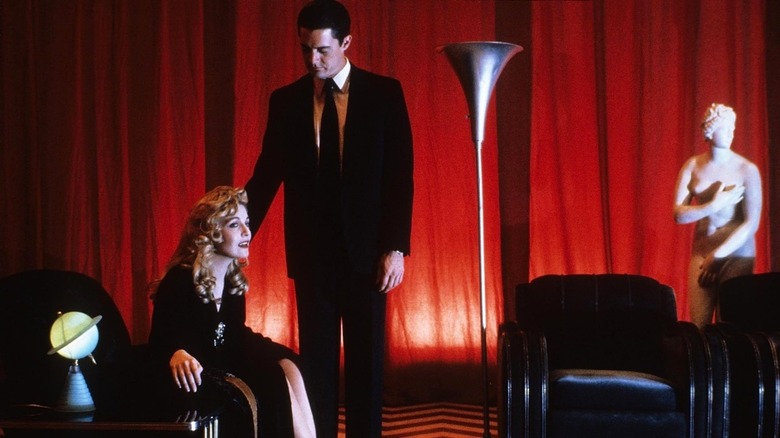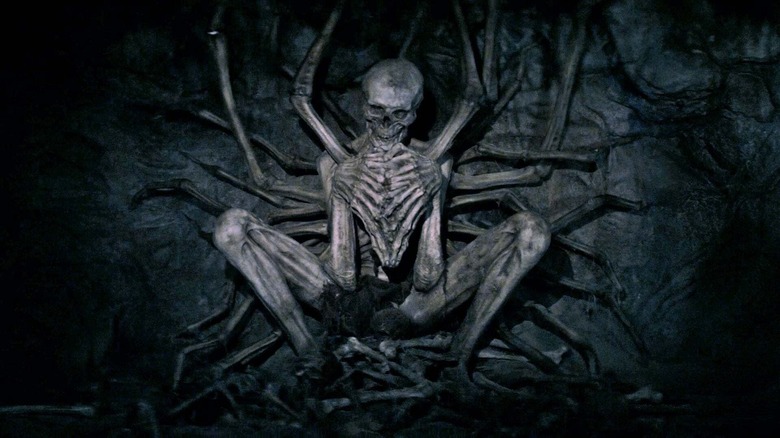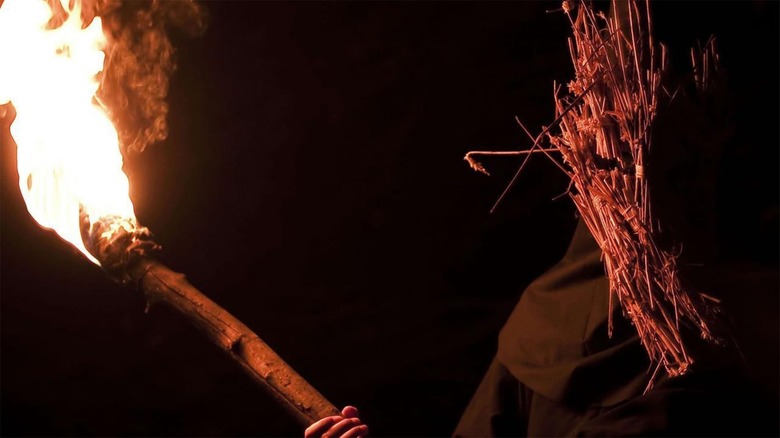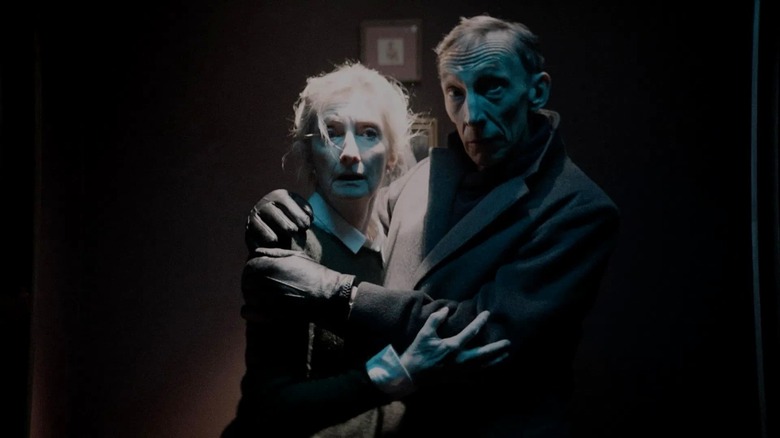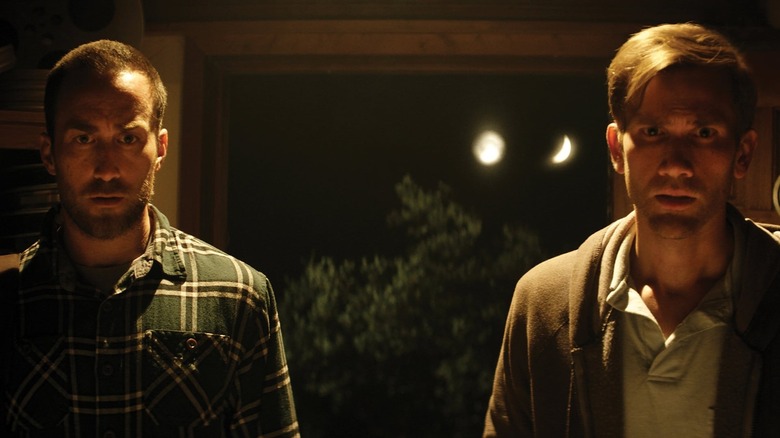12 Movies Like Hereditary That Are Worth Watching
Ari Aster's feature directorial debut "Hereditary" took the world by storm in 2018, rocking the box office and receiving critical acclaim. It was an explosive demonstration of vision and technique from a relatively new director and his talented cast and is arguably one of the stand-out examples of a modern horror revival in mainstream cinema.
If you loved "Hereditary", there's no doubt you're hungry for more of that brand of nerve-searing cinema. Of course, you certainly can't go wrong by checking out Aster's 2020 follow-up, "Midsommar," starring Florence Pugh, but there's a wide world of provocative, terrifying, and artistically brilliant cinema out there. Rather than just recommend the biggest horror hits of recent years, we've concocted a selection of films that either directly inspired "Hereditary" or share its DNA in their own chilling ways. From the '70s to today, from rural Korea to worlds between worlds, from fright to chill to "what the hell?" here are 12 movies like "Hereditary" you've got to check out.
Don't Look Now
One of the best ways to deepen your understanding and enjoyment of a movie is to look at the films that inspired it. "Don't Look Now", the 1978 thriller by "The Man Who Fell to Earth" and "The Witches" director Nicolas Roeg, has been cited by Ari Aster as one of his major influences in crafting "Hereditary".
Adapted from Daphne Du Maurier's short story (the same Du Maurier whose fiction was previously adapted by Alfred Hitchcock into "Rebecca" and "The Birds") the film stars Donald Sutherland and Julie Christie as a grieving couple whose young daughter drowned on the family property.
When John Baxter (Sutherland) is offered a job restoring a church in Venice, he and his wife, Laura (Christie), take the opportunity to put distance between themselves and the trauma of losing their daughter. After a strange encounter with a psychic woman who warns the couple of danger and multiple sightings of what appears to be a young girl who looks like their child, the Baxters' time of healing becomes a terrifying hunt for the truth.
"Don't Look Now" is one of the late director's finest works and boasts one of the most disturbing and iconic endings in horror history. It's easy to see why it's one of Aster's favorite films, and with any luck, it might become yours, too.
Suspiria (2018)
Remakes are a contentious topic, and few have been as polarizing in recent years as the Hollywood remake of Dario Argento's 1977 masterpiece "Suspiria".
There's no denying the brilliance and importance of Argento's original. It's a breathtaking spectacle of maximalist production design, with a rightfully deserved legacy that hasn't wavered since its release. However, there's an argument to be made that the remake by "Call Me By Your Name" director Luca Guadagnino stands on its own as a remarkably disturbing and more narratively rich interpretation of the original premise.
The film notably subverts major elements of its predecessor. Gone are the fluorescent lighting and unearthly rasps and guitar melodies of Goblin. Here, Radiohead's Thom Yorke composes the score. Guadagnino's palette is meaningfully muted, leaning into the bleak atmosphere of 1970s West Berlin where protagonist Susie Bannion (Dakota Johnson) has recently emigrated from the United States. Susie arrives to audition at the Markos Dance Company, a renowned German academy run by Madame Blanc (Tilda Swinton in one of three roles). Strange happenings and whispered accusations of witchcraft within the ranks of the academy soon reveal a sinister conspiracy.
While this is a recommendation for the 2018 remake — it's far closer in form to "Hereditary" — you should make an effort to watch both. Argento and Guadagnino are both auteurs with a wicked eye and ear for horror, and we'll leave it up to you to decide what works best.
The Wailing
In his now-famous Golden Globes acceptance speech after the best foreign language film award went to "Parasite" in 2020, South Korean director Bong Joon-ho stated that "Once you overcome the 1-inch-tall barrier of subtitles, you will be introduced to so many more amazing films". He was damn right, and horror is no exception.
Like "Hereditary", Na Hong-jin's "The Wailing" is a phenomenal work of mystery and terror. The 2016 film concerns the arrival of a Japanese stranger in a remote Korean village, an event which sparks inexplicable illness and violent behavior in the village's population. As a local police officer investigates, his own family becomes involved in the increasingly bizarre and frightening plot.
Coming in at just over two-and-a-half hours, it's a fairly lengthy film for the horror genre, but Hong-jin's narrative never wavers in intrigue or tension. You'll be questioning the source of the terror right up until the movie's stunning conclusion. It's a truly fantastic example of Korean horror cinema at its best.
Ordinary People
Another film cited by Ari Aster as inspiration for "Hereditary" may surprise you. This one's not a horror flick.
With spectacular roles in films ranging from "Butch Cassidy and the Sundance Kid" to "Sneakers" and "All Is Lost," Robert Redford is best known as an actor. Younger audiences might even recognize him as S.H.I.E.L.D. official Alexander Pierce from "Captain America: The Winter Soldier." However, Redford's also a talented director, and in 1980, he proved it with his directorial debut, "Ordinary People."
Poor Donald Sutherland can't catch a break. Here, he and Mary Tyler Moore star as a grieving couple caught in the wake of their eldest son's accidental death. A young Timothy Hutton stars as Conrad, the family's youngest, who has recently returned home after some time in a psychiatric ward. He's still reeling from the loss of his brother — which he harbors immense guilt for — and a growing rift between himself and his mother drives him to seek psychiatric help from Judd Hirsch's Dr. Berger.
"Ordinary People" is adapted from Judith Guest's novel of the same name. Although it's not a horror film, it deals with a lot of the same psychological elements that drive "Hereditary." Mary Tyler Moore also gives a wonderful performance that goes against her typically comedic television background. It's no wonder that the film cleaned up at the 53rd Academy Awards, winning four of its six nominations, including best picture and best director.
Lake Mungo
"Lake Mungo" is a bit of a hidden gem. Released in 2008, this Australian faux documentary is the only feature film by director Joel Anderson, who crafted one of the most haunting works of 21st-century horror.
Composed of interviews, found footage, and archive media, "Lake Mungo" tells the tale of Alice Palmer, a 16-year-old girl who accidentally drowns while on a trip with her family. As the family tries to move forward with their lives, odd occurrences in their home kick off a story that takes several jaw-dropping turns, using the documentary form to chill audiences far beyond the end credits.
While the film wasn't a mainstream success like "Hereditary," it has a cult following that continues to thrive in online horror communities. It even received the spooky stamp of approval from directors like Rob Savage ("Host") and Justin Benson and Aaron Moorhead ("Synchronic", "Moon Knight"), who spoke of its influence and legacy in UK distributor Second Sight's 2022 re-release of the film.
The Night House
The name David Bruckner might ring a bell for avid horror fans. He's the talented director behind films such as the "Amateur Night" segment of "V/H/S," 2017's "The Ritual," and was even attached to one of several now-canceled "Friday the 13th" reboots planned under Paramount Pictures in recent years. (We're still sore about that one.)
His next project will be a reboot of "Hellraiser" for Hulu with writers Ben Collins and Luke Piotrowski, and if you're interested in seeing how great a team-up that trio is, you'd do well to check out "The Night House" from 2021.
Rebecca Hall stars as Beth, a grieving widow who is struggling to keep herself together in the wake of her husband's sudden suicide. He's left behind not just tragedy but a collection of bizarre curiosities: a cryptic, threatening note to Beth and floor plans for their home that don't make sense.
Beth begins to suspect there was far more to her late husband's life than she ever knew, and as she follows the threads, she finds herself the target of an otherworldly conspiracy. As always, Hall is brilliant in the role of Beth, and Bruckner's inventive use of camera perspective offers scares that go beyond the typical. It's a strange and clever film that's well-suited as a double feature paired with "Hereditary."
If you or anyone you know is having suicidal thoughts, please call the National Suicide Prevention Lifeline by dialing 988 or by calling 1-800-273-TALK (8255).
Antichrist
If you're looking for something more on the extreme side, Lars von Trier's "Antichrist" from 2009 fits the bill.
Frequent Von Trier collaborators Willem Dafoe and Charlotte Gainsbourg star as a married couple whose infant child tragically falls to his death while the pair are sleeping together. Dafoe's character, a therapist, decides to take his wife to a remote cabin to heal their trauma, but what ensues is a descent into madness and horror in many forms.
If you've ever seen a Von Trier film, you'll know he's both an auteur and a provocateur. "Antichrist" looks and feels as arthouse as the rest of his filmography, but it's also just as disturbing and visceral as any traditional horror film. "Hereditary" has some spectacularly shocking moments of physical violence amongst the psychological elements, but what awaits you in "Antichrist" is a step above.
Whether that's a selling point or not will depend on what kind of viewer you are, but if you're looking for something with the family drama, occult themes, and bodily trauma of "Hereditary" cranked up to 11, cautiously check this one out.
Twin Peaks: Fire Walk with Me
Although "Twin Peaks: Fire Walk with Me" is a feature film prequel to a television show, we're still recommending it for its thematic connections to "Hereditary." Plus, it's a masterpiece in its own right.
"Twin Peaks" is a masterful mash-up of soap operas, murder mystery, and surreal horror that originally aired between 1990 and 1991. FBI Special Agent Dale Cooper (Kyle MacLachlan) arrives in the small town of Twin Peaks, Washington, to solve the murder of Laura Palmer (Sheryl Lee), a local teenage girl. Through the genius of creators David Lynch and Mark Frost, the show spirals off into a head-spinning genre soup like nothing else.
Unfortunately, ABC's creative meddling in the show's second season prompted Lynch's departure, and declining viewership led to its demise after 30 episodes. At the time, a Lynch-directed series finale wasn't enough to save "Twin Peaks," but it left the door open for more. In 1992, Lynch returned for "Twin Peaks: Fire Walk with Me," a dark depiction of the final week of Laura Palmer's life. It didn't offer a conclusion to the second season's cliffhanger, which proved a controversial move at the time of its release. Nonetheless, the film is a phenomenal portrait of the darkness underneath suburbia.
It's best enjoyed after watching the original two seasons of "Twin Peaks," followed by Showtime's 2017 revival "Twin Peaks: The Return," but no matter how you take a journey to Lynch's sinister small town, you'll never forget it.
The Empty Man
"The Empty Man" had a rocky road to release. Originally filmed in 2017, David Prior's film languished in production hell for several years after test screenings spooked 20th Century Fox. Finally released in 2020, the film has since developed a cult following.
Adapted from the graphic novel of the same name by Cullen Bunn, "The Empty Man" is the first feature film from Prior, who was previously known for his many documentaries on the production of films, including those by David Fincher.
There's a lot going on in this film, including similarities to "Hereditary" like family trauma, grief, conspiracy, and the occult. Beyond that, it's a moody thriller that incrementally becomes a paranoid cosmic horror nightmare. The stunning opening segment stands on its own as a genuinely frightening and well-crafted short film. It follows a group of tourists in the mountains of Bhutan who fall prey to a mysterious sound — or whatever's creating it. This feeds into the main narrative in which a grieving ex-cop finds himself wrapped up in a missing-persons case that goes beyond the boundaries of the crime thriller into much more esoteric territory.
It's a blessing that "The Empty Man" finally saw a release because it shows great promise for Prior as a director. Here's hoping its dedicated following inspires another great horror film.
Kill List
British director Ben Wheatley is a name to look for if you're seeking out strange and well-crafted genre cinema. With nine feature films under his belt since his 2009 film debut, "Down Terrace," Wheatley has tackled a wide range of genres from crime drama to occult horror to action comedy. Wheatley's most brilliant film, 2011's "Kill List," blends those genres in inventive and effective ways.
Neil Maskell stars as Jay, a former British soldier who has retired to settle down with his wife and son. Haunted by an unspecified but visibly traumatic mission in Kyiv, Ukraine, Jay reluctantly takes on one final job with his former partner, Gal (Michael Smiley), to correct the family's financial situation.
What begins as a gritty and tense assassination thriller gives way to a far more chilling, atmospheric occult conspiracy film. Like "Hereditary," "Kill List" doesn't tip its hand too soon. Its darker genre elements unfold with sinister patience.
It's a clever and heavy-hitting fusion of genres that is undoubtedly one of the best horror films of the 2010s.
Anything for Jackson
Ari Aster turned heads following the release of "Midsommar" with the declaration that his next feature film wouldn't be a horror movie, but instead something in the realm of comedy. For those concerned, "Anything for Jackson" is a prime example of why you shouldn't be too hasty to question a talented filmmaker's ability to shift genres.
Released in 2020, this collaboration between director Justin G. Dyck and screenwriter Keith Cooper follows an elderly couple grieving their grandson's tragic passing. They kidnap a heavily pregnant woman, intending to transplant their dead grandson's spirit into her unborn child but face interruption from meddling forces.
It's a dark premise, but the whole thing plays out with an impressively well-balanced sense of terror and absurdity. "Wrong Turn" and "Supernatural" actor Julian Richings is a big part of this tonal duality, giving a charismatic performance rooted in devotion and love regardless of the cost.
It's a remarkably scary film from a filmmaking duo who, before "Anything for Jackson," was best known for producing made-for-television Christmas movies together. With any luck, the pair will continue to delve deeper into the horror genre, as they've proved they've got the knack.
The Endless
One of the horror genre's many truths is that it's possible to get under an audience's skin without the need for blockbuster budgets. The duo of Aaron Moorhead and Justin Benson, who most recently directed episodes of Netflix's "Archive 81" and Marvel's "Moon Knight," have proven this time and time again with their deceptively small-scale feature films.
In "The Endless," which connects directly to their 2012 debut feature, "Resolution", Moorhead and Benson star as brothers Aaron and Justin. Having fled a rural commune as children, the true nature of which the pair disagree on, the brothers are intrigued by the arrival of a video cassette containing a recorded message from the commune, inviting them back.
They reluctantly return to the group, curious to get closure on their experiences as youths. While they receive a warm welcome, it soon becomes clear that something isn't right at Camp Arcadia — something that goes far beyond what either of them could have imagined.
"The Endless" isn't just an effective sci-fi-supernatural-occult horror film, but a full-circle realization of themes the pair have been dabbling in from the beginning of their filmmaking relationship. Like their most recent theatrical release, "Synchronic," it's a testament to Moorhead and Benson's ability to tell stories with enormous scope using great and deliberate restraint.
